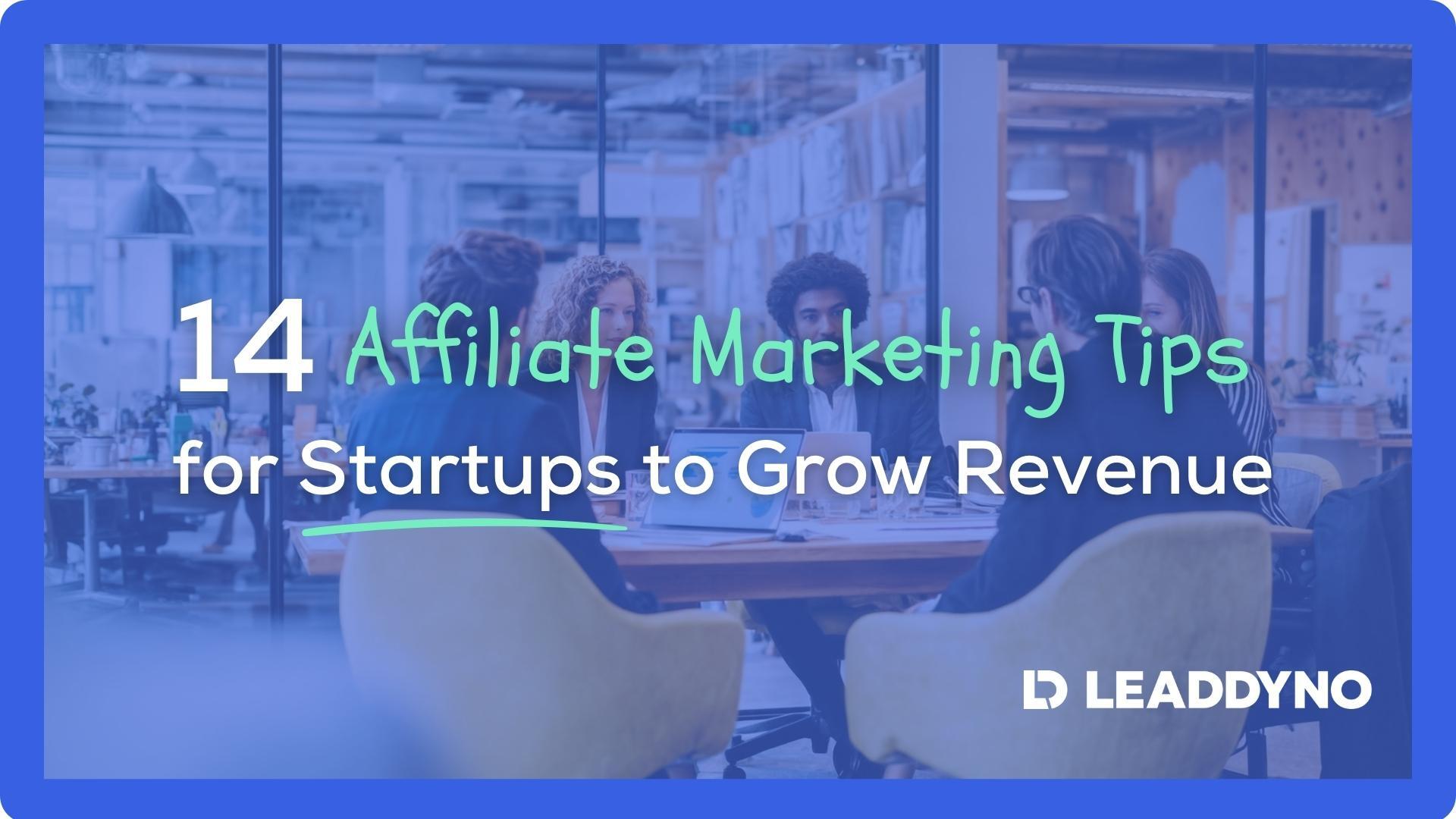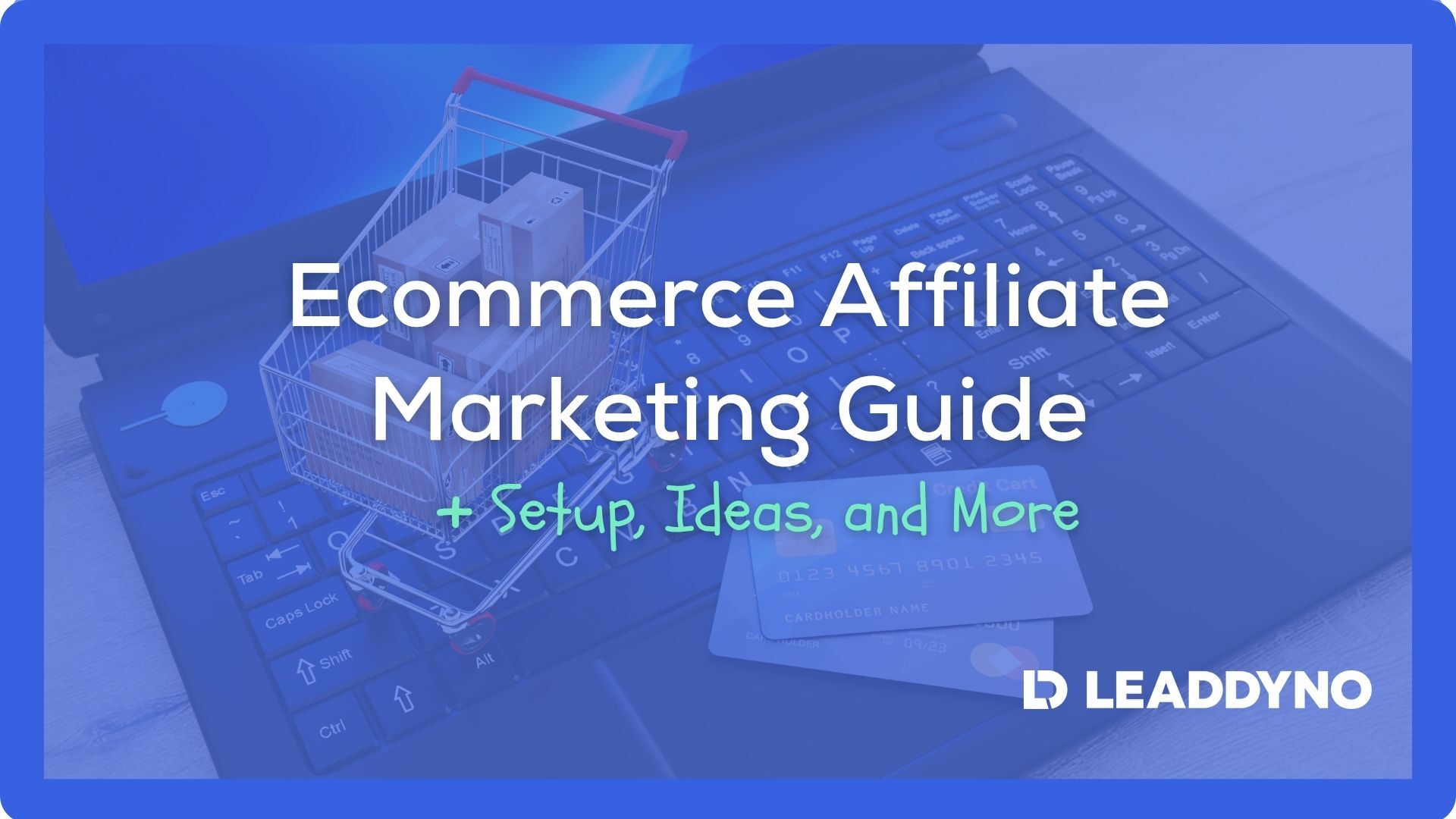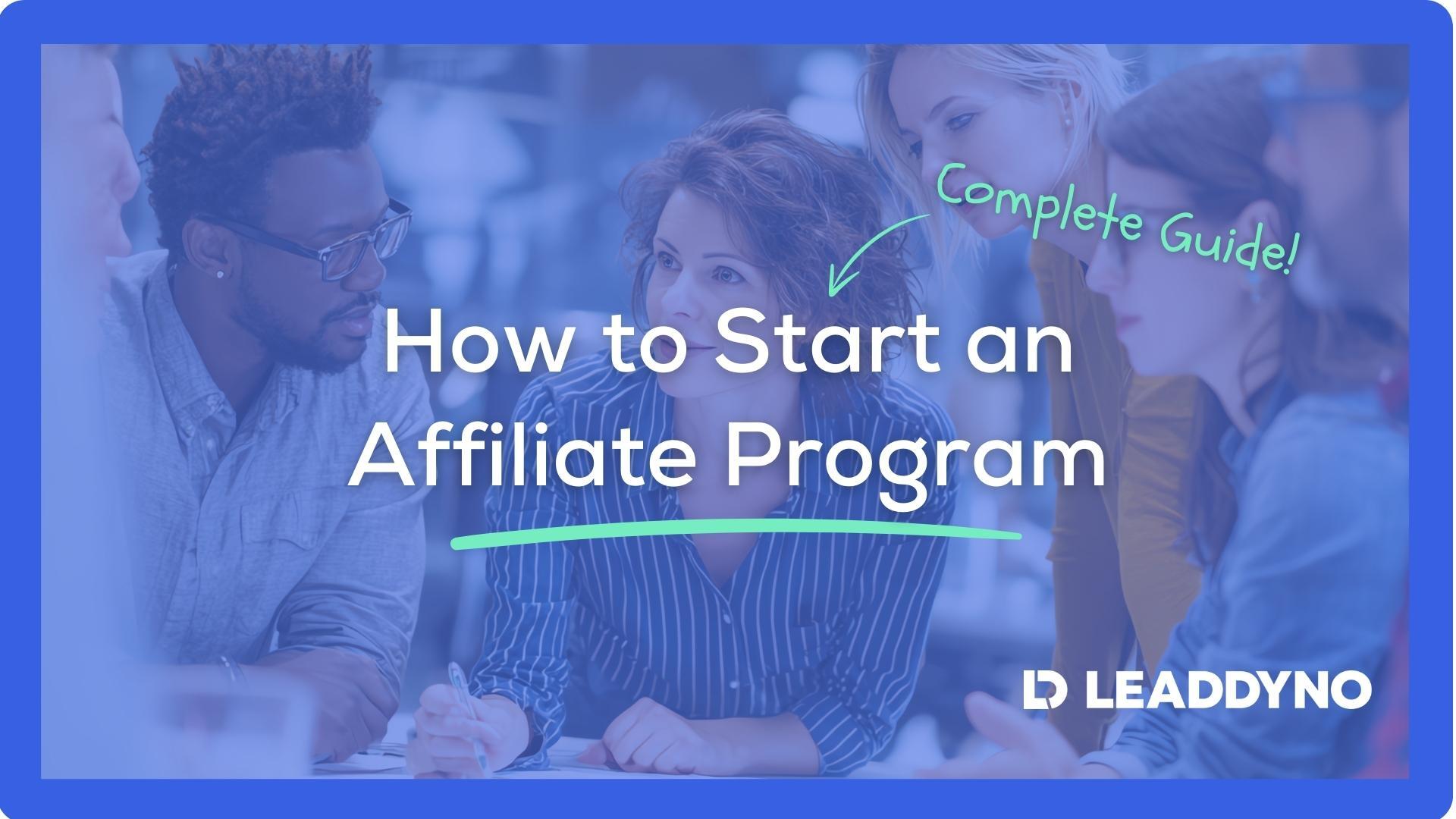Recruiting Affiliates 101: How to Find Affiliates as a Brand
Published:
November 4, 2025
Written by: Sarah Lasko
Published:
November 4, 2025
Written by: LeadDyno Admin
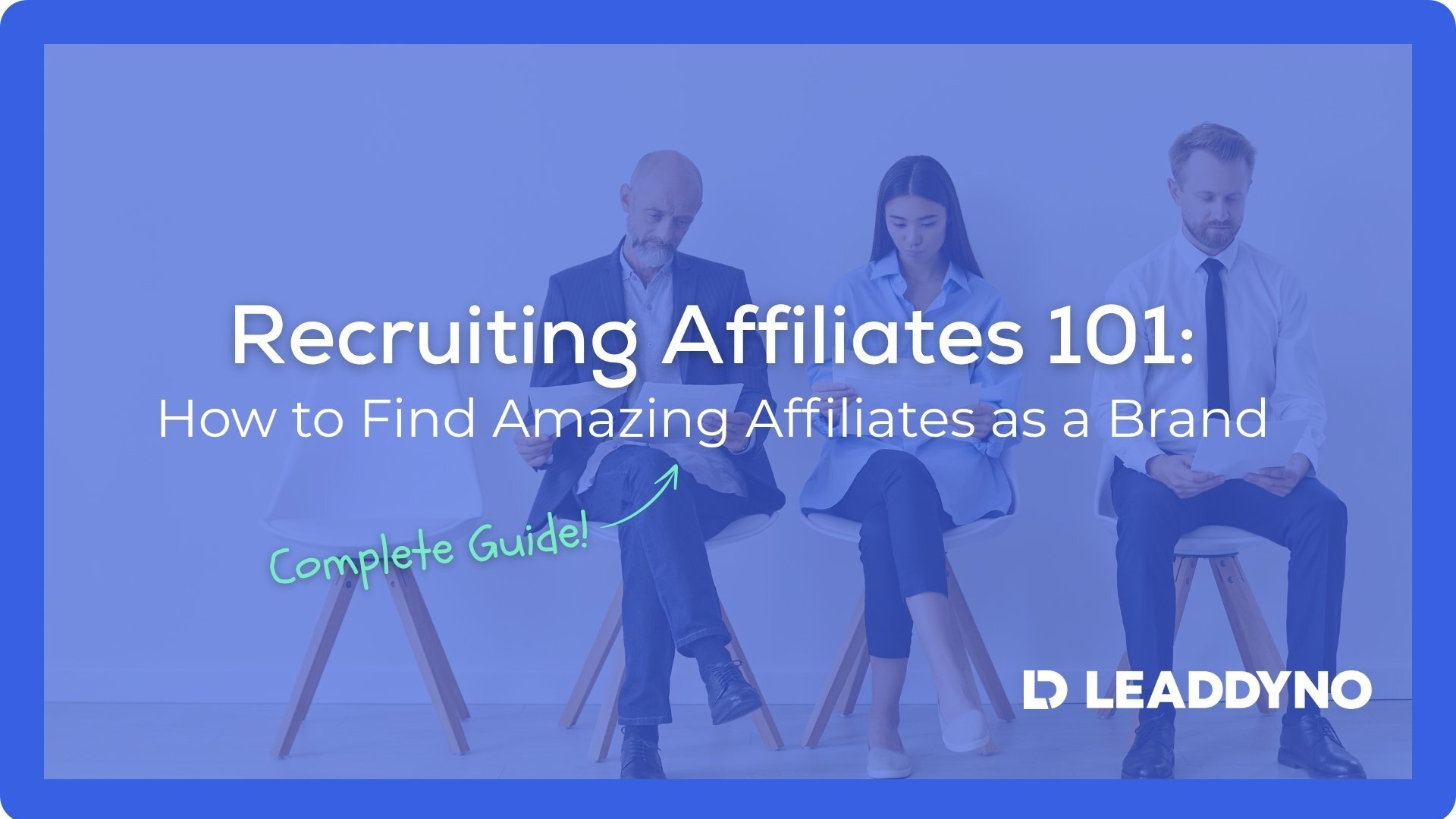
Book a Demo
See how LeadDyno can take your affiliate marketing strategy to the next level. Let’s set up a 1:1 demo to get your questions answered.
Download your FREE Affiliate Agreement Template
Oops! Something went wrong while submitting the form.
Thank you!
Oops! Something went wrong.
Introduction
Whether you're launching your first affiliate program or looking to scale an existing one, recruiting quality affiliates requires a systematic approach.
You need partners who not only have the right audience but also align with your brand values and can authentically promote your products or services.
This comprehensive guide will walk you through proven strategies to find new affiliates through actionable steps, for both immediate and long-term implementation. Plus, we’ll cover advanced techniques to build deep affiliate partnerships.
The importance of affiliate recruitment for your program’s success
An affiliate program is only as strong as its partners. Without a dedicated group of high-quality affiliates, even the most well-structured program can struggle to gain traction. Here’s how strong recruitment efforts set you up for success.
Leverage Diverse Audiences
By recruiting affiliates with varied sub-niches and audiences, your brand's reach expands. Affiliates connect you to segments that you might not have been able to target through traditional marketing methods.
According to Hostinger, affiliate marketing accounts for nearly 16% of global e-commerce sales. This demonstrates the undeniable impact affiliates have on building new relationships with potential customers.
Boost Credibility and Trust
When affiliates promote your product or service, they often do so with a level of authenticity that resonates with their audiences. People trust recommendations from influencers and content creators they follow, which can lead to higher conversion rates. A Nielsen study revealed that 92% of consumers trust recommendations from individuals over brands directly, showing the value affiliates bring as trusted advocates.
As Zig Ziglar said, “If people like you, they’ll listen to you, but if they trust you, they’ll do business with you.” This is the foundation of successful affiliate marketing.
Improve SEO Performance
Quality affiliate content contributes to your brand’s backlink profile, which is a key factor in search engine rankings. Affiliates with strong domain authority linking to your website can indirectly help increase your visibility on search engines, leading to a higher volume of organic traffic.
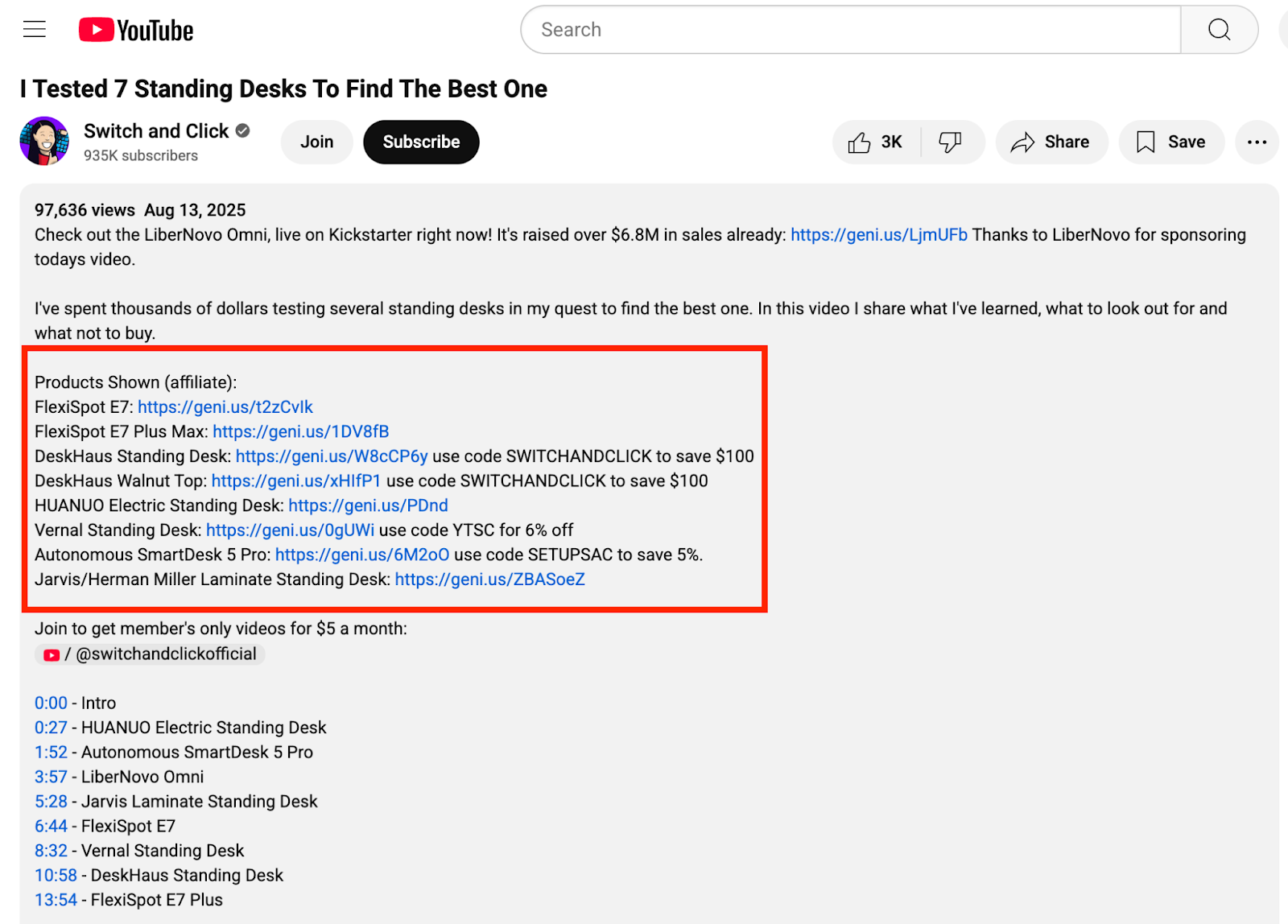
Understanding which kind of affiliate is right for your brand
Not all affiliates are equal. The "best" partners for one brand might be a terrible fit for another. The key is to find affiliates whose audience, values, and content style align with your own brand.
Think about it: If you sell high-end, sustainable skincare, partnering with a budget-focused coupon site might get you clicks, but it won't attract your ideal customer. The conversions will be low, and the brand association could be damaging. Instead, a collaboration with a beauty blogger who champions eco-friendly products would be a much more authentic and effective partnership.
Influencers
Influencers are individuals with dedicated followers on social media platforms like Instagram, TikTok, or Snapchat. They’re great at creating authentic and engaging content around your brand to help drive awareness and sales. The right influencer can make a big difference for your affiliate program.
Bloggers
Bloggers create written content that often includes in-depth product reviews, tutorials, and their personal recommendations. With their ability to drive organic traffic through search engines, these partners can be valuable for long-term relationships.
YouTubers
YouTubers are great for visual storytelling and in-depth product reviews in video format. Their content typically resonates on a deep, personal level that garners high engagement.
Instagrammers
Affiliates on Instagram specialize in eye-catching visual content, like photos and Reels. Entertainment niches also are very popular on Instagram.
App Owners
App owners use mobile apps to drive affiliate marketing through push notifications, in-app ads, or integrated content. This approach is excellent for targeting mobile users specifically.
Finding the Right Affiliate
The right affiliate has an audience that trusts its recommendations. When they promote your product, it should feel like a genuine endorsement from a friend, not a random advertisement. And choosing the right affiliate type is an important part of that.
{{blog-cta}}
How to recruit affiliates for your brand’s program
Now that you have an understanding of the types of affiliates you may want for your program, it’s time to start the recruitment process.
Step 1: Define Your Ideal Affiliate Partner
Before you can find your ideal affiliates, you need to know who you’re looking for. Create a detailed profile and "persona" of your perfect affiliate partner.
Consider these factors:
- Niche: Topics they cover (e.g., fitness, tech, home decor).
- Platform: Their primary audience location (e.g., blog, YouTube).
- Audience Demographics: Their follower profiles and target customer alignment.
- Content Style: Their tone and aesthetic (e.g., humorous, educational).
- Engagement Metrics: Community activity beyond follower counts.
This persona will be your north star in your search. We recommend constantly referencing this as you go through the next steps, to ensure you’re always on the right track.
Example
If your brand specializes in herbal supplements geared toward improving sleep and reducing stress, you could partner with an influencer who frequently shares content about managing anxiety, mindfulness practices, or natural remedies for better rest. You’d want to look for someone who actively discusses topics like bedtime routines, herbal teas, or the benefits of specific natural ingredients.
Step 2: Find Where Your Audience Hangs Out Online
Here are some practical methods to help you pinpoint these key spaces and effectively identify potential affiliates:
Use Google Search and Operators
A powerful and free tool is Google search. You can search for blogs, forums, or influencers in your niche using targeted queries.
Use search operators like intitle: or inurl: to fine-tune your results.
For instance, if you're in the fitness industry, search intitle:"top fitness blogs" or inurl:"fitness forums" to quickly locate relevant places your audience might frequent.
Or, try queries like:
- “best [your product] reviews”
- “[your niche] bloggers”
- “top [your niche] YouTubers”
Ask ChatGPT for Suggestions
AI tools like ChatGPT can provide recommendations based on your niche. Simply prompt ChatGPT with something like “Where do fans of eco-friendly living gather online?” or “Suggest top forums and blogs for pet owners.”
The tool can give you a starting point by listing forums, blogs, or platforms tailored to your target market.
Use Social Media Search Functions
Popular social platforms have search features that make finding your audience easy. Use hashtags or keywords to uncover Instagram influencers, X communities, or TikTok creators.
For instance, searching “#travelhacks” on Instagram or TikTok can reveal creators who align with a traveling audience.
Join Online Communities Yourself
Online communities like Reddit or Facebook Groups can also be great for recruiting affiliates in your niche. For example, if you focus on home gardening, join communities like "r/gardening" to observe audience behavior and identify potential collaborators who have influence in those spaces.
Need help? Access this list of subreddits to find your communities there. Or browse Facebook Groups here.
Step 3: Conduct Competitor Research
Your competitors can be a goldmine of information. Tools like Ahrefs or Semrush can reveal which websites are linking to your competitors, which could contain lists of their affiliate partners who link to products or landing pages.
Don’t just copy their list, though. Use it as a starting point. If an affiliate is having success promoting a similar product, they're likely a great fit for you, too.
To take your competitor affiliate research to the next level, modern tools like SEMrush provide powerful ways to uncover valuable insights quickly.
Use their “Backlink Analytics” tool to analyze your competitors’ websites. Simply input their domain, and SEMrush will display a list of all the backlinks pointing to their site. Look for blogs, review sites, or niche platforms in the results—these are often affiliates driving traffic for your competitor.
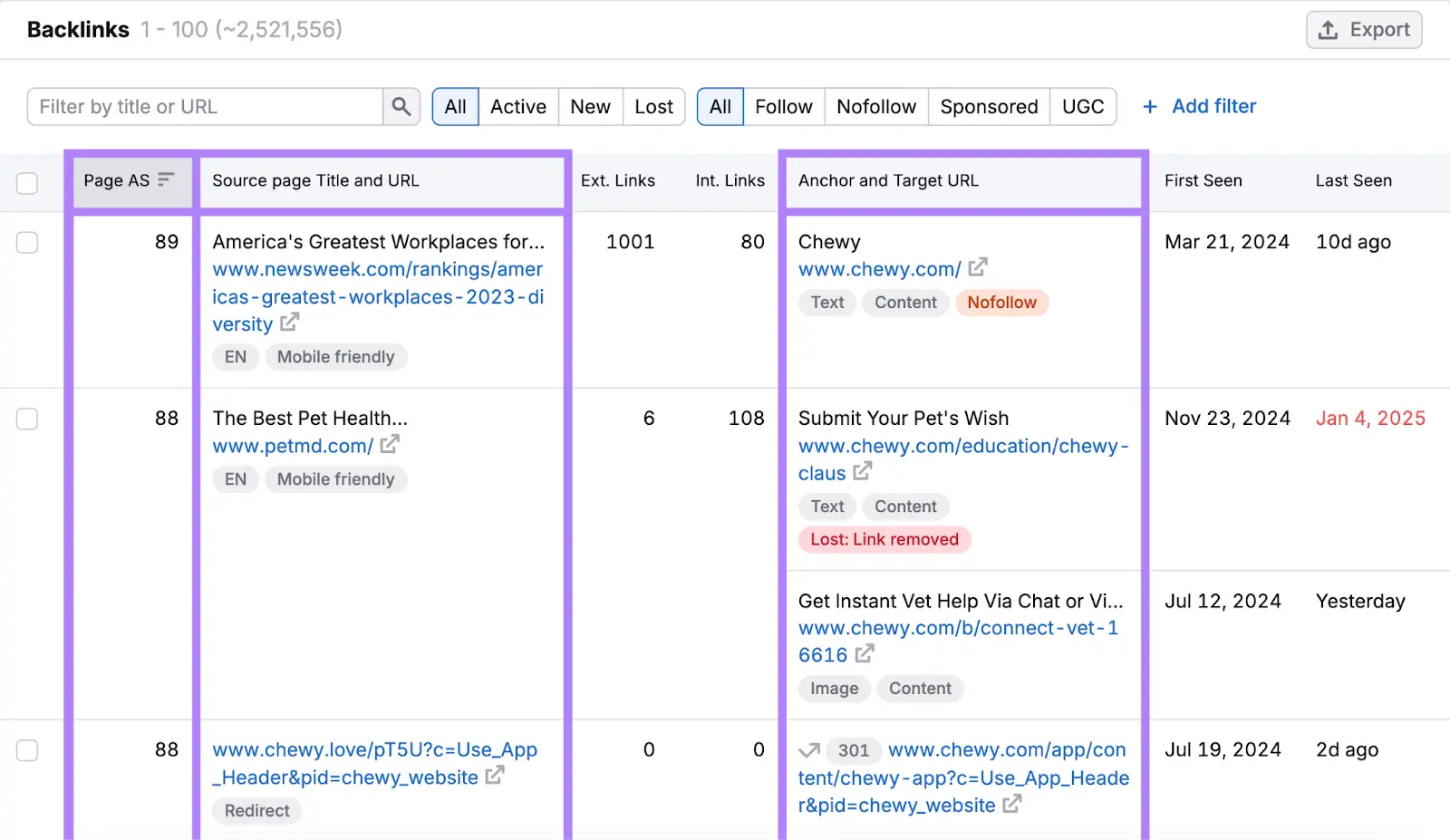
Step 4: Develop Affiliate Program Marketing Materials
When you reach out to potential affiliates, you need to make a great first impression. Prepare professional marketing materials, like a landing page, that clearly outlines the benefits of your program. Your marketing materials should include:
- A brief overview of your brand and products
- Your commission rate and cookie duration
- Details on payment schedules and methods
- Marketing assets you provide (e.g., banners, email templates)
- A link to your affiliate application
Step 5: Tap Into Your Current Networks
Your best future affiliates might already be in your brand’s circle as current customers, integrations, partners, or influencers.
When it comes to presenting your new marketing materials in step 4, the right format is key to attracting potential affiliates. This is especially important when tapping into existing relationships that the brand has already established. This includes your:
Website: On your website, dedicate a specific page or a clearly visible section to your affiliate program. Use headings, bullet points, and engaging visuals to communicate your key value for potential affiliates.
Social Media: Platforms like Instagram, LinkedIn, and Facebook are excellent for reaching potential affiliates, depending on your target audience. Make a few posts on all company social media accounts.
Newsletters: Lastly, if you have a newsletter or email list, dedicate a segment to promoting your new or existing affiliate program.
Step 6: Offer Undeniable Commissions
Your affiliate commission structure needs to be competitive and attractive. This is best done by researching what your competitors are offering and aim to meet or beat it. While a high commission rate is appealing, you can also offer performance-based bonuses, tiered commissions, or other incentives to motivate affiliates. A great offer shows that you value your affiliates' hard work.
Understand Affiliate Needs
Try to set some time to chat with potential affiliates or current members of your program to understand their expectations. Some affiliates may value higher percentage rates, while others might be more motivated by bonuses for meeting milestones or consistent performance.
Introduce a Tiered Incentive System
A more complicated strategy to think about can also include a tiered commission structure that rewards performance. For example, offer a base commission rate for entry-level affiliates, but provide incremental increases as they hit revenue milestones or drive consistent traffic.
Pro Tip: Think About Stakeholder Approval for These Commissions
Getting company stakeholder signoff for offering strong commissions requires a clear and compelling business case. Begin by outlining how these investments will drive long-term growth and highlight the potential return on investment (ROI).
For instance, imagine a company is looking to expand its market presence and considering a sponsorship deal with a high-profile athlete like Serena Williams. By affiliating with such a globally recognized figure, the company may boost their brand’s visibility, credibility, and sales within the tennis market.

Step 7: Make The Application Process Easy
You wouldn’t make your customer jump through hoops, so don’t make potential affiliates jump through hoops to join your program. Your application form should be simple, straightforward, and quick to complete. Only ask for the essential information you need to approve them. A long, complicated process can scare away excellent candidates.
Using Software to Make This Easy
LeadDyno streamlines the affiliate onboarding experience, making it easy for both program managers and potential partners. You can create a user-friendly registration process that collects only the necessary information.
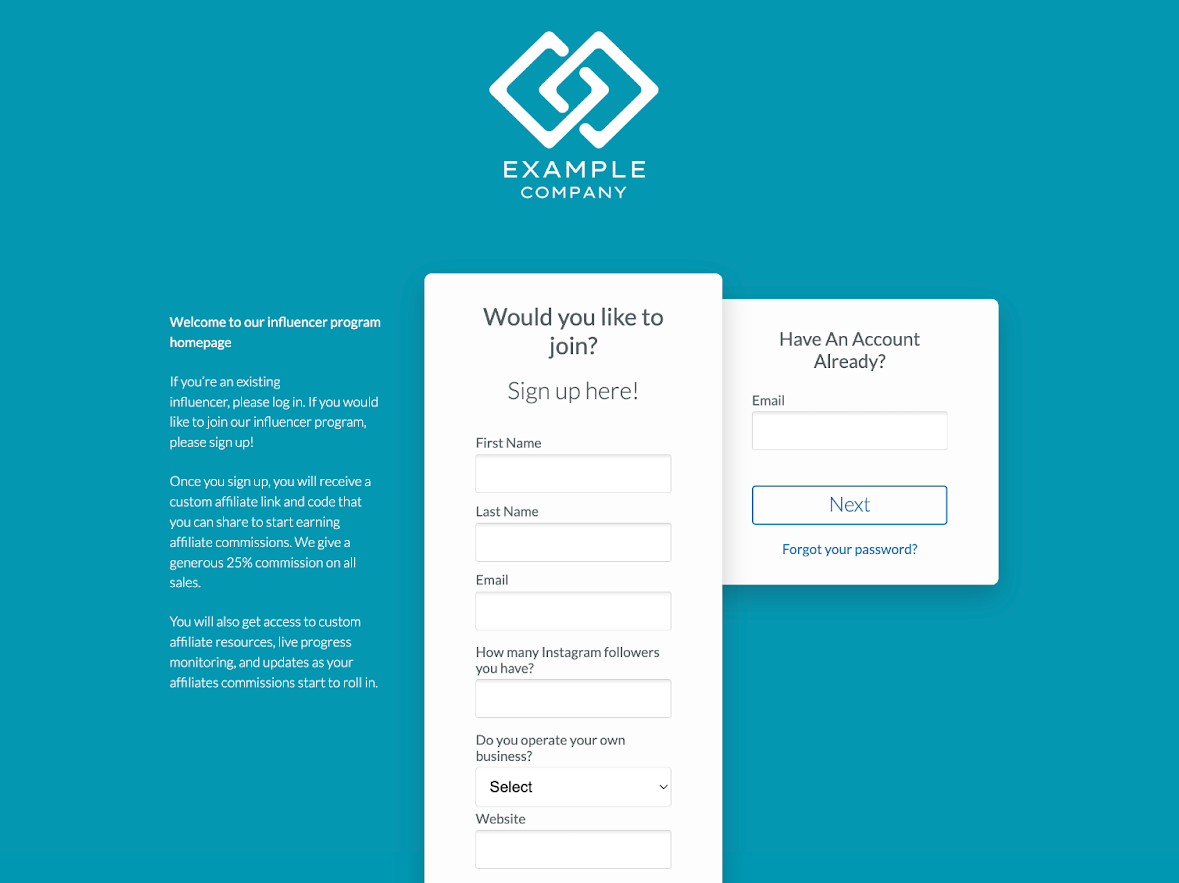
{{blog-cta}}
Step 8: Provide Ongoing Support
Recruitment doesn't end once an affiliate is approved. The best affiliate programs provide continuous support to help their partners succeed. This includes regular communication and fresh marketing materials. And when your affiliates feel supported, they're more likely to stay engaged and actively promote your brand.
Creating a systematic process will make your recruitment efforts much more effective and sustainable for the future.
Recommended Resource: 17 Essential Affiliate Marketing KPIs and Metrics
More ideas for finding affiliates
While there’s a lot to do in those 8 steps, here are some additional tips and tactics for affiliate recruitment.
Attend Creator Or Affiliate Events [Both Online & Offline]
Industry events are fantastic opportunities for face-to-face networking. Conferences like Affiliate Summit and Creator Economy Expo bring together thousands of content creators and brands. If you can attend to network and chat with potential affiliates, that can help build a solid foundation for a continued affiliate relationship.
Add Your Affiliate Program to Company Emails
Include a link to your affiliate program landing page in your company's email signatures. Every email your team sends is a chance to discreetly advertise your program to potential partners who are already in contact with your business. Simple works.

Link Your Affiliate Program On Your Website
Make it easy for interested creators to find your program. We recommended adding an "Affiliates" or "Partner With Us" link in your website's footer menu.
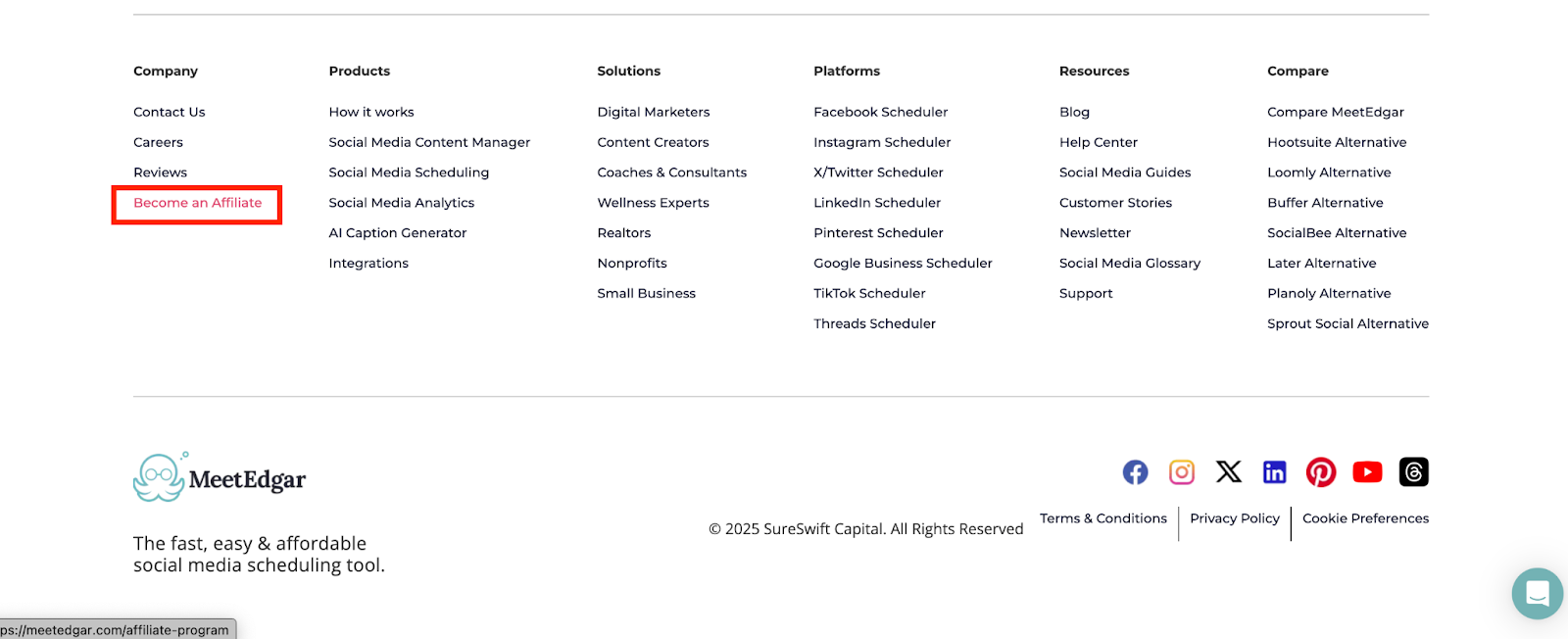
Reach Out In Relevant Forums And YouTube Comment Sections
You’d be surprised how well this works for signing your first few affiliate partners. Participate in discussions and leave thoughtful comments on YouTube videos in your niche. While you should avoid spammy self-promotion, you can build relationships and subtly mention your brand when it's relevant.
Keep Current Affiliates Happy using Technology
Your current affiliates are your best asset. Keeping them happy and motivated is important for long-term success. A powerful affiliate management software like LeadDyno can automate commission management, link tracking, payments, and communication, freeing you up to focus on strategy.
You can also have a different dashboard for different groups to provide a truly customized and segmented experience for different affiliate partners.
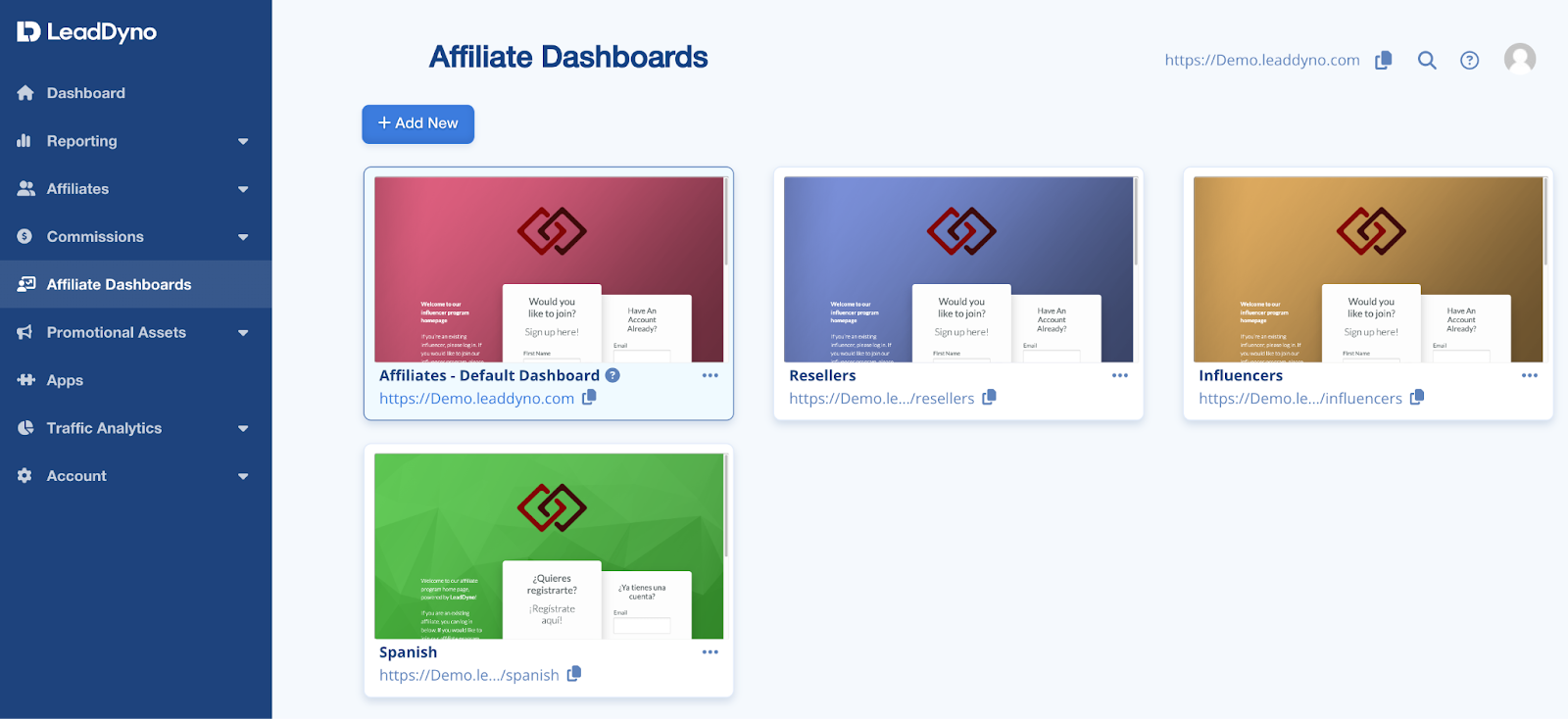
Final thoughts
It all starts with a strategic approach to recruitment. By defining your ideal partner and using a proper outreach strategy, you can build a thriving community of affiliates who are excited to work with your brand.
Don’t forget that technology is your best friend in this process. If you’re ready to transform your affiliate program? Start a free trial of LeadDyno now and drive more revenue for your business.
Download your FREE Affiliate Agreement Template
Oops! Something went wrong while submitting the form.
Thank you!
Oops! Something went wrong.
.webp)
Written by:
Sarah LaskoSarah is an NYC-based business, technology, and arts writer who specializes in B2B writing for thriving SaaS tech apps. You can view her portfolio here.
Published on
This is some text inside of a div block.
Written by:
LeadDyno AdminLaunch your affiliate program with confidence thanks to our 30-day free trial. Learn more...
Published on
This is some text inside of a div block.
Written by
LeadDyno AdminLaunch your affiliate program with confidence thanks to our 30-day free trial. Learn more...
Published on
This is some text inside of a div block.
.svg)
Start a Free Trial
30 days free · Full Access
Cancel anytime
You might also be interested in...
Get Started Today
Launch your affiliate program with confidence thanks to our 30-day free trial. Begin building a program that delivers results.
Start Free Trial
30 Days Free



